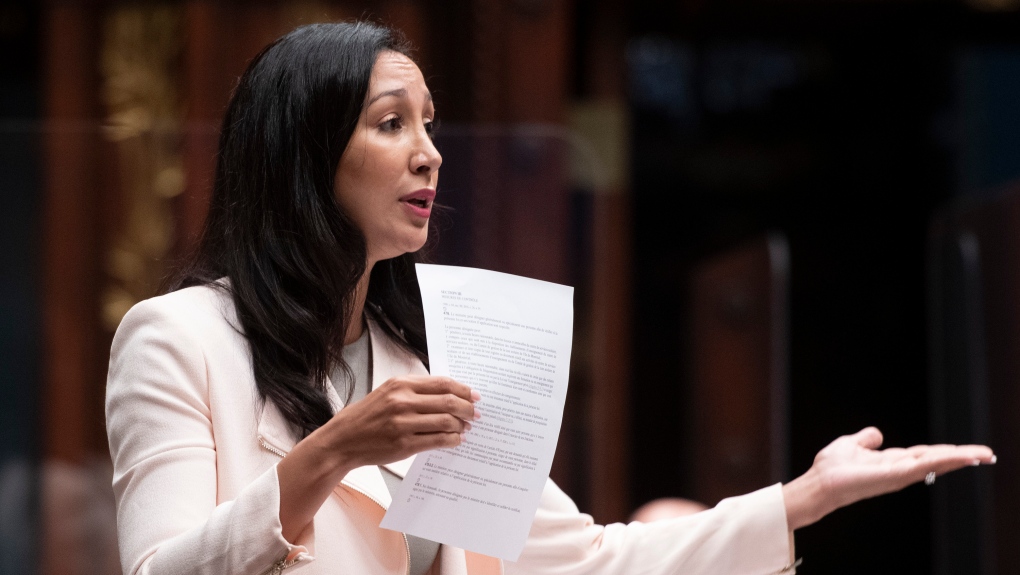Air quality and COVID-19: Quebec Opposition MNA tables bill to install air monitors, purifiers in every classroom
A bill introduced to the national assembly Wednesday would equip every Quebec classroom with an air purifier and sensor that monitors carbon dioxide levels, impose new maximum CO2 concentrations, and make CO2 data available to the public.
Higher levels of CO2 concentrations suggest air isn’t circulating properly indoors, signifying a higher potential for the spread of COVID-19. While the province considers 1,000 parts per million (ppm) to be an ideal target, data presented by the ministry last week suggests 724 classrooms have a weekly average CO2 concentration that exceeds 1,500 parts per million (ppm), while 72 classrooms exceed 2,000 ppm.
Quebec Liberal MNA Marwah Rizqy tabled Bill 192, An Act to ensure student health and safety in the classroom by regulating ambient air quality in schools, with hopes that the national assembly will move quickly to pass it.
“We can work on this bill right now,” Rizqy told reporters in Quebec City.
“The (Parti Quebecois) makes a big deal about King Charles, and now we are able to table a bill within a few days,” she said in reference to Bill 4, which aims to make the King's oath optional and allow PQ members to sit without swearing allegiance to the British monarchy.
Time is of the essence, as it was highlighted earlier this month by Quebec Education Minister Bernard Drainville that carbon dioxide concentrations are likely to rise as the weather gets colder and schools close their windows.
 Quebec Liberal Opposition Education and Higher Education Critic Marwah Rizqy questions the government during question period in this file photo dated Thursday, September 23, 2021. THE CANADIAN PRESS/Jacques Boissinot
Quebec Liberal Opposition Education and Higher Education Critic Marwah Rizqy questions the government during question period in this file photo dated Thursday, September 23, 2021. THE CANADIAN PRESS/Jacques Boissinot
Under Rizqy’s bill, the 1,000 ppm target would become the legal limit. Schools would be compelled to provide weekly reports to the ministry, which would then be made public.
The proposed limit is even tighter during pandemic times, restricting the acceptable limit to 800 ppm until the WHO says the health crisis is over.
"The particles, they are in the air and they remain in the air for 12 to 48 hours," said Nancy Delgrave, scientific coordinator of the COVID-STOP group, who appeared with Rizqy during Wednesday's press conference.
"To reduce the contagion of respiratory viruses, and also to reduce their severity, it is important to treat the air," she said.
A VOW FROM THE FORMER MINISTER
Last year, then-Education Minister Jean-Francois Roberge vowed to equip classrooms with CO2 detectors by the end of the 2022 school year, following concerns over air quality in schools.
At the time, the minister released a letter to directors general outlining his plans to require the readers in libraries, gymnasiums, daycare rooms and other spaces.
CTV News has reached out to the ministry for a status update on the rollout of the devices.
"Laying down a bill at this point is redundant, I believe," said Quebec Provincial Association of Teachers President Heidi Yetman.
She told CTV she would rather the province prioritize classroom repairs.
"We need to make sure the windows are able to open. We have to make sure that we have ventilation," she said.
-- Published with files from The Canadian Press
CTVNews.ca Top Stories

DEVELOPING Jasper updates: Wildfire reaches Fairmont Jasper Park Lodge
One of two wildfires threatening Jasper National Park has reached the townsite.
Alberta calls in army to assist with wildfire situation
Alberta has called in the Canadian Armed Forces to help assist with the worsening wildfire situation in the province.
Biden explains why he ended re-election bid in Oval Office address
U.S. President Joe Biden on Wednesday delivered a solemn call to voters to defend the country's democracy as he laid out in an Oval Office address his decision to drop his bid for reelection and throw his support behind Vice President Kamala Harris.
Barrie-Innisfil MPP 'blacked-out' and crashed car into window of child care centre
Staff at a Barrie child care centre say they are frustrated by what they call a local MPP's inadequate response after a car crashed through a window in one of the toddler rooms.
Norad intercepts Russian and Chinese bombers operating together near Alaska in apparent first
The North American Aerospace Defence Command (Norad) intercepted two Russian and two Chinese bombers flying near Alaska Wednesday in what appears to be the first time the two countries have been intercepted while operating together.
2 Canadians being 'sent home immediately,' removed from Olympic team after drone incident
An analyst and an assistant coach with Canada Soccer are being removed from the Canadian Olympic Team and 'sent home immediately,' according to the Canadian Olympic Committee.
An unwelcome attendee has joined the Paris Olympic Games: COVID-19
After a handful of Australian water polo players tested positive for COVID-19 this week, questions have emerged around how the spread of the disease will be mitigated at the Summer Olympic Games in Paris.
Vacations, meals, booze: Contractor used $100K of charity's money for personal expenses, B.C. court finds
A B.C. man who was hired to help a non-profit build a food hub but instead spent the money on personal expenses – including travel, restaurants, booze and cannabis – has been ordered to pay more than $120,000 in damages.
Male, female killed, 2 others injured in 'gun battle' outside Toronto plaza: police
Two people are dead and two others suffered serious injuries following a shooting that police have described as a 'gun battle' outside a plaza in Scarborough, Ont. early Wednesday morning.
































